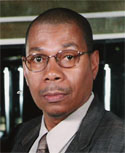

Teaching Philosophy
I recognise that each student will learn in different ways. I also realise that many students have not been exposed to the attitudinal approaches necessary for success in their studies as well as in their lives. Many lack confidence, in their ability to succeed at studying as well as at the personal level, and many are apprehensive about being at university. No successful teaching experience can ignore these and other factors which loom large in the minds of our students.
My courses are structured to take into account the different learning styles of students in a particular class without signalling to them that there is any hierarchy of learning abilities. I frequently refer to life experiences and current events, use learning hooks, engage my students in intense discussions, and employ visual aids and graphical illustrations in order to cater to the range of learning styles and facilitate the reinforcement of important concepts in the course content. In addition, I firmly believe that we should have fun during the process of teaching and learning. As a result, ice breakers are shared with students for short intervals, when it is felt that a rest pause is necessary. My courses are also structured to facilitate the steady building of confidence levels in the students. Course content is organized so that concepts graded by difficulty can be mastered incrementally. There is no greater reward than seeing students emerge from their cocoon and grow in confidence as they master concepts and information that they previously thought were intimidating.
I consider that every learning tool, system and methodology available is to be used in the teaching process when appropriate. As a youngster in high school, I realized that, in many cases, my interest in a topic was linked as much to the means of delivery as to the content itself. I believe it is the same for students now. What of course is different is the range and diversity of instruction methods. The fast-changing technology and the ease with which today’s student grasp these technologies; demand that I maintain currency not just in the content of my courses but also in my delivery techniques. Apart from my own constant search for various methods, I take every opportunity to expose myself via formal training to the ever-improving range of teaching methods that become available.
It is not unusual during the course of teaching that students raise issues that point to personal or attitudinal weaknesses. I do not consider it a deviation from my task as a teacher to take time out to discuss with a class difficulties and challenges of this nature. I have discovered that on some occasions, learning problems faced by students are overcome with advice on personal organization rather than explanation of academic material. At other times, I share with my students lessons learned from the ups and downs of my own personal life’s journey and that of others. I have found this to be particularly important because one of the strange tendencies of the young is the feeling that whatever difficulty they face is unique to them. The advantage then of sharing with them life lessons is that they begin not just to realize that they are not alone in their fears but that their challenges have been met successfully by others. I constantly adopt John Maxwell’s (2010) approach of connection, which he defines as the ability to identify with people (in this case student) and relate to them in a way that increases your influence with them. This interaction is just one component of releasing the “I can do” attitude critical to success in the academic courses they undertake as well as in their personal goals.
As a part of the confidence-building process, I try to give students a wider concept of their importance to the home, school, community and nation. I challenge them to find their passion, strive for excellence and to be more concerned with their character – who they really are – rather than with their reputation – what others may think of them. I do not consider that my teaching assignment is ever finished until students in my classes are very clear that the Caribbean’s development depends on each of them.